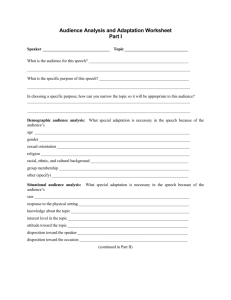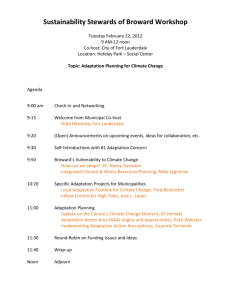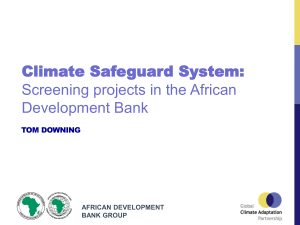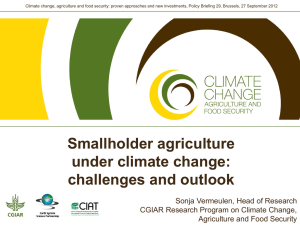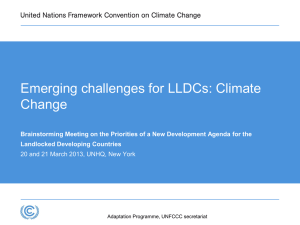ActionAid Principles for Equitable Adaptation Funding
advertisement
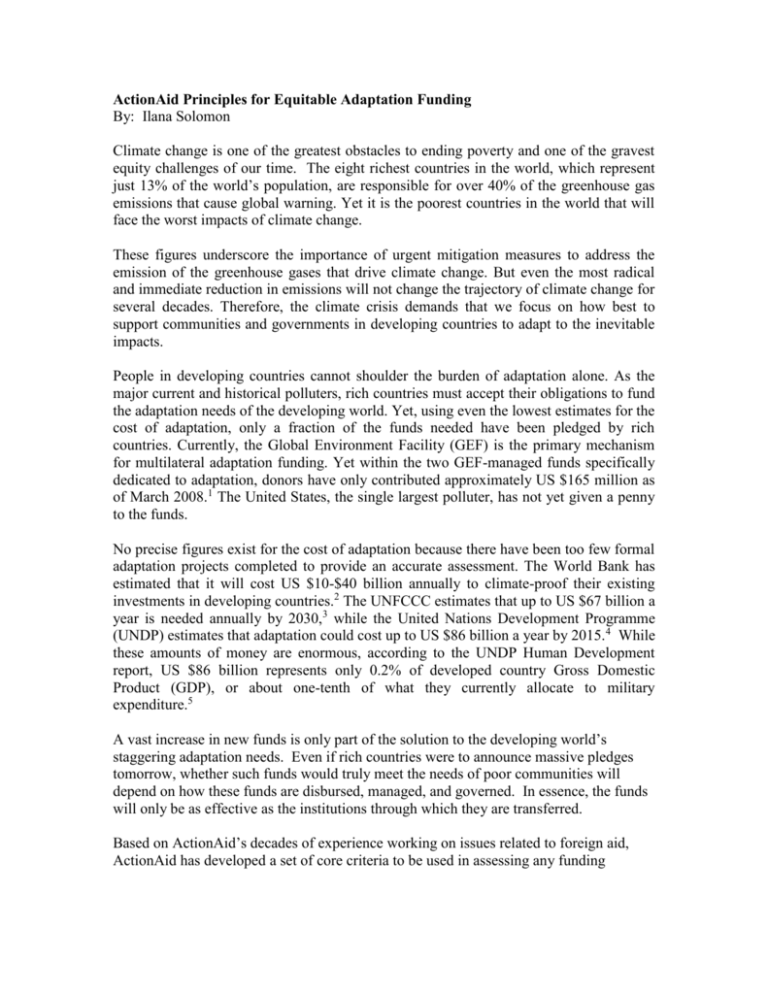
ActionAid Principles for Equitable Adaptation Funding By: Ilana Solomon Climate change is one of the greatest obstacles to ending poverty and one of the gravest equity challenges of our time. The eight richest countries in the world, which represent just 13% of the world’s population, are responsible for over 40% of the greenhouse gas emissions that cause global warning. Yet it is the poorest countries in the world that will face the worst impacts of climate change. These figures underscore the importance of urgent mitigation measures to address the emission of the greenhouse gases that drive climate change. But even the most radical and immediate reduction in emissions will not change the trajectory of climate change for several decades. Therefore, the climate crisis demands that we focus on how best to support communities and governments in developing countries to adapt to the inevitable impacts. People in developing countries cannot shoulder the burden of adaptation alone. As the major current and historical polluters, rich countries must accept their obligations to fund the adaptation needs of the developing world. Yet, using even the lowest estimates for the cost of adaptation, only a fraction of the funds needed have been pledged by rich countries. Currently, the Global Environment Facility (GEF) is the primary mechanism for multilateral adaptation funding. Yet within the two GEF-managed funds specifically dedicated to adaptation, donors have only contributed approximately US $165 million as of March 2008.1 The United States, the single largest polluter, has not yet given a penny to the funds. No precise figures exist for the cost of adaptation because there have been too few formal adaptation projects completed to provide an accurate assessment. The World Bank has estimated that it will cost US $10-$40 billion annually to climate-proof their existing investments in developing countries.2 The UNFCCC estimates that up to US $67 billion a year is needed annually by 2030,3 while the United Nations Development Programme (UNDP) estimates that adaptation could cost up to US $86 billion a year by 2015.4 While these amounts of money are enormous, according to the UNDP Human Development report, US $86 billion represents only 0.2% of developed country Gross Domestic Product (GDP), or about one-tenth of what they currently allocate to military expenditure.5 A vast increase in new funds is only part of the solution to the developing world’s staggering adaptation needs. Even if rich countries were to announce massive pledges tomorrow, whether such funds would truly meet the needs of poor communities will depend on how these funds are disbursed, managed, and governed. In essence, the funds will only be as effective as the institutions through which they are transferred. Based on ActionAid’s decades of experience working on issues related to foreign aid, ActionAid has developed a set of core criteria to be used in assessing any funding mechanism for adaptation. Application of these principles is necessary to address the needs of those most vulnerable to climate change: 1. Democratic Governance: A system of democratic governance will ensure that all decision-making power, rights, and responsibilities are equitably distributed among the countries represented in the mechanism. There are various ways to ensure democratic decision-making. Options include each country representing one vote (referred to as one-country-one-vote); or a more complex voting system that weights voting share according to various factors such as population density, emissions levels, and vulnerability to climate change; or a double majority system in which decisions have to gain a majority of votes under a weighted system as well as a one-country-one-vote system. ActionAid believes that more discussion and analysis is needed to endorse a specific method of democratic decision making for an adaptation funding mechanism. However, a system that weights votes purely according to financial contributions is counter to the principle of democratic decision making. For example, the IMF and World Bank have long been criticized for their system of weighted voting, based on the financial strength and contributions of member countries.6 A "one-dollar-one-vote" system would place developing countries at a clear disadvantage – despite the fact that they have not been the major contributors to climate change. Another important aspect of democratic governance is meaningful transparency and accountability. Accountability in the funding relationship must flow not only from recipients to donors, but also from donors to recipients, including communities of poor and excluded people. This means ensuring transparency and clarity on amounts and sources for all funds received and amounts and uses for all disbursed funds. It is also necessary to create an enforcement mechanism to allow poor countries to hold their governments and donors accountable to the commitments they have made. Where appropriate, gender-disaggregated data should be used for allocation and disbursement and incorporated into public documents. 2. Civil Society Participation: It is widely accepted that ownership is the cornerstone of development; unless poor countries are able to direct their own development paths, development will fail to be inclusive, sustainable, or effective.7 Country ownership of development programs should be understood not only as government ownership; the involvement of civil society stakeholders in the formulation and delivery of policy and programs should be seen as integral parts of ensuring real ownership. With respect to adaptation, poor communities have already been coping with climate change for decades, and they know best what strategies for adaptation will work in their local contexts. For these reasons, the adaptation funding mechanism must guarantee community level participation — particularly through leaders or institutions accountable to poor people, such as parliaments, local government, community-based organizations, women’s organizations, farmers’ organizations, labor unions, and so forth. Participation of women and women’s organizations is essential, as funding for adaptation must address the needs of poor women. Civil society participation will be key in deciding how funds are disbursed and used as well as by whom projects are implemented, monitored and evaluated. 3. Sustainable and Compensatory Funding: Due to the enormity of climate change-related threats, it is essential that the funding mechanism has the capacity to manage sufficient funds for addressing poor countries’ adaptation needs. The funding mechanism should be dedicated not to short-term fixes, but to predictable and dependable funding streams. Additionally, adaptation finance must be based on the “polluter pays” principle, which recognizes that financing for adaptation is not owed to poor countries as “aid,” but as compensation from high-emissions countries to those that are most vulnerable to the impacts.8 In the same manner, funds must be provided in addition to existing Overseas Development Assistance (ODA) commitments. Funds must also be in addition to the 1970 UN commitment in which donors agreed to spend 0.7 percent of their gross national income on ODA.9 Finally, adaptation finance must be given as grants, not loans. 4. No Economic Policy Conditionality: “Conditionality” refers to the often controversial economic policy changes upon which donors condition access to aid. Donors use conditionality in a number of ways: as a means of holding recipient governments accountable for aid, as a commitment device, and as a way of inducing policy change.10 There is a growing consensus that the impact of conditionality on poor countries has often been negative.11 As the ActionAid International report “Real Aid: An Agenda for Making Aid Work”12 states, one of the strongest criticisms of conditionality is that it has given significant policy influence to donor agencies, which are outside the domestic political process and therefore not answerable to the electorate. Conditionality thus serves to undermine ownership and domestic accountability. Another important critique of conditionality is that it lends itself to “stop/start” financing because any noncompliance with conditions will often result in the donor abruptly ending its aid program and sending a signal to other donors that the country is no longer trustworthy.13 Because of the harmful impacts associated with conditionality, in addition to the fact that financing for adaptation must not be considered aid in the first place, access to money in the adaptation fund must not be contingent on economic or other reforms. 5. Access for the Most Vulnerable: Various impediments often prevent the most vulnerable communities from accessing much-needed funding. These barriers may include a lack of information about a fund and the way it works, the complexity of program design and implementation, and the need for compliance with overwhelming administrative and financial management requirements. Because climate change will affect poor women disproportionately, it is essential that an adaptation mechanism be structured in a way that facilitates access by women and other vulnerable communities. The principle of access to the most vulnerable is complimentary to the principle of non-discrimination, which requires the equal treatment of an individual or group irrespective of their particular characteristics. The Adaptation Fund, which was operationalized at COP 13, provides a good example of how these princples could be implemented.14 For example, the Adaptation Fund is governed by a board made up of representatives from a majority of developing countries, and it has taken great steps towards transparency by allowing UNFCCC accredited observers to attend the board meetings, by web-casting board meetings, and by making accessible the agenda and relevant documents of each board meeting. Furthermore, allowing Parties to access resources directly from the Fund (as opposed to working through implementing agencies), a defining characteristic of the Adaptation Fund, should lead to increased access for the most vulnerable and the absence of economic policy conditionality. ActionAid commends the work of the Adaptation Fund Board in establishing guidelines that adhere to many of these important principles. We believe the Adaptation Fund should continue in the post-2012 agreement as a key mechanism for financing adaptation. Other adaptation funding mechanisms, inside and outside of the UNFCCC, should also adhere to these principles. ActionAid is an international anti-poverty agency working in over 40 countries, taking sides with poor people to end poverty and injustice together. For more information, please see www.actionaid.org and www.actionaidusa.org Global Environment Facility, “Facility (Prepared by the Trustee), Status Report on Climate Change Funds as of April 30, 2007.” 2 Clean Energy and Development: Towards an Investment Framework, April 5, 2006 3 UNFCCC: ttp://unfccc.int/files/meetings/intersessional/awg_4_and_dialogue_4/application/pdf/070828_fin_flow_factshe et.pdf 4 UNDP Human Development Report 2007/2008. Fighting Climate Change: Human Solidarity in a Divided World. 5 Ibid. 1 6 Hans W. Singer "Bretton Woods and the UN system - relationship of the International Monetary Fund and the World Bank to the UN." Ecumenical Review, The. July 1995. FindArticles.com. 18 Oct. 2007. http://findarticles.com/p/articles/mi_m2065/is_n3_v47/ai_17386929 7 ActionAid. “Making aid accountable and effective: The challenge for the Third High Level Forum on aid effectiveness. Accra, Ghana 2008.” June 2007. 8 Oxfam International. Adapting to Climate Change: What’s needed in poor countries, and who should pay. Oxfam Briefing Paper. 9 1970 General Assembly Resolution, paragraph 43. This target has been affirmed in many international agreements over the years, including the March 2002 International Conference on Financing for Development in Monterrey, Mexico and at the World Summit on Sustainable Development held in Johannesburg, also in 2002. 10 ActionAid International. June 2005. “Real Aid: An Agenda for Making Aid Work.” 11 For example, see DFID/FCO/HM Treasury, Partnerships for Poverty Reduction: rethinking conditionality, 2005. 12 ActionAid International. June 2005. “Real Aid: An Agenda for Making Aid Work.” 13 Ibid. 14 ActionAid will monitor the Fund’s ability to adhere to the principles after it begins to disburse funding.


